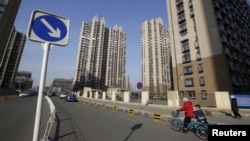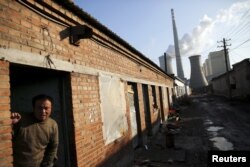China’s capital, Beijing, has announced plans to open up full legal residence to more Chinese from other towns and cities around the country. The new points system will create a much-needed window for millions of Chinese who have left their homes in rural parts of the country to work in Beijing.
But analysts say the plan is likely to only benefit a selected few.
Late last week, the municipal government in Beijing finalized a points system for household registration, or hukou as it is called in Chinese. Starting next year, migrants in Beijing can apply for hukou -- an upgraded residency status, which ensures citizens access to public services in the capital, such as health care and schools, if they meet the criteria.
Applicants under the age of 65 and with no criminal record must own local residency permits and have paid social security premiums in Beijing for seven consecutive years. Their employment, accommodation, educational background, skill level, tax payments, and credit records, among others, will be converted into points under the new scheme.
On an annual basis, the city government will earmark a total required point total as the threshold to grant hukou as it aims to cap its population at 23 million by 2020. Beijing’s population is already estimated to have exceeded 21 million – more than London and New York City combined, but nearly half of those residents are migrants who do not have legal residence in the city.
The new scheme could add an additional barrier to stop migrants from flooding into the city, although the impact of the curb may be limited, analysts said.
Transparent, yet unfair
They added that the new points system may be transparent enough to make the city’s much-coveted hukou less of a backroom deal, but it is still heavily skewed toward high-end talent. That, they argue, will not only hurt the city’s development as a balanced economy, but also put socio-economically-disadvantaged migrants in a much more difficult situation.
“Before [the new regulation], I think it [was] not very clear – a black-box. But right now, it’s that, you know, whether you’re qualified or not. But those criteria are, to a migrant worker, [out] of the reach,” said Wu Xiaogang, a professor of social science at Hong Kong University of Science and Technology (HKUST).
“In particular, the under-educated population in Beijing faces an unfair opportunity. It will be hard for the low-end labor force to accumulate enough points to obtain a hukou in Beijing,” said Hu Xingdou, an economics professor at Beijing Institute of Technology, adding that much of the city’s regulation such as house rental policies has already been unfriendly to lowly-paid blue collars.
Citing experience from Shanghai and Guangzhou, Lu Yilong, a sociology professor from Renmin University, argued that only the top one percent of applicants will likely be awarded with hukou, that is, “a small window for the selected few.”
Yet the new scheme may swamp the city government with millions of applications a year, which will surely impose a burden on its coffers, Lu warned in an emailed reply to VOA.
The professor said access to top-quality higher education is the Holy Grail behind hukou in top-tier cities like Beijing and Shanghai. If equal opportunity is addressed, the pressure of gaining a hukou in Beijing will be much alleviated, he said.
While some “Beijing drifters” look forward to competing for a hukou, the majority, nevertheless, responded to the new household system with indifference.
“It gives you hope that, if you work hard and earn enough points, you can become a Beijinger. But the hope will never come true,” a Weibo user commented.
Another user sneered at the high bar for Beijing citizenship and asked “shall those who can’t meet the [new] bar have their existing household permits revoked?”
Migrants to stay
All in all, Wu of HKUST said that the new scheme will do little to reduce the migrant population if it still offers job opportunities they can’t find back home. In other words, Beijing will continue to suffer worsening congestion and pollution if the local government fails to ease population numbers.
Many argued that the best cure doesn’t lie in the capital city, but in the nation’s efforts to develop many of its second-tier cities, where growing job opportunities will naturally attract the flows of migrants.
But the Beijing government’s mindset to attempt to keep the low-end labor force out shows a lack of vision to build Beijing into a balanced economy, where there should be room for all walks of life to prosper, professor Hu said.
Otherwise, the cost of living in Beijing will greatly surge, he warned.








